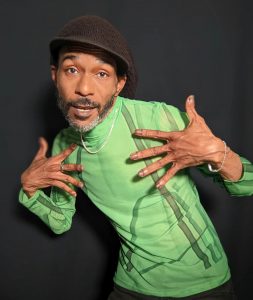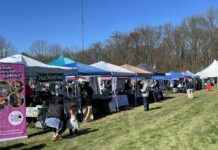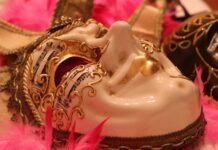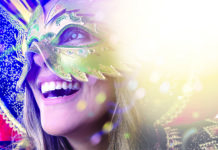Alan Zeitlin | Special to the JT
When the Orioles played at home, Yitz Jordan, aka “Y-Love,” didn’t need to turn on his TV to know if they won.
He lived behind what was then called Memorial Stadium, now Camden Yards.
“We used to sell spaces on our lawn as parking spots,” recalled Jordan. “We could hear when they won.”

Jordan heard great applause for himself as a rapper performing with the likes of Matisyahu, Kosha Dillz and Erez Safar, who was known as Diwon. He performed at Irving Plaza and other hot New York City venues and places around the country, including Baltimore.
“It was electric and a rush, but I was never in it for fame,” said Jordan. “What was great was when my shows turned people on to Judaism. One time, two girls came up to me and said they were going that study the parshah after coming to one of my concerts. So that was cool.”
As a high school student at Baltimore Polytechnic Institute, he said he was learning more and more about Judaism.
“The hood is never far from the frum community,” he said, adding that there were gangs about four blocks from where he lived. “People were asking me, ‘How come you wear a yarmulke, but I saw you eating this or that? Do you have a sukkah? Do you have a shofar? It was not really mean, but more to see if I was posing or I was for real. That only accelerated my learning.”
He said he didn’t listen to much hip hop growing up, and enjoyed heavy metal and punk rock. But when he went to the yeshivah, Ohr Samayach, in Jerusalem, his chevruta (Talmudic study partner) was a rapper. He realized he could be one, too.
He said he enjoyed he enjoyed his college years at Towson University. When he decided he wanted to convert to Judaism, his mother didn’t think it was a wise move.
“She said they would never accept me, and they would never allow me into their community,” he recalled. “Ultimately, it was tzedakah [‘charity’] from the frum community that helped pay for her funeral. So, it was like not only did they accept me, they accepted her.”
He said she passed away in 2004 a few years after he moved to New York City.
He said his mother saw him at the “end of the struggle period” but believes that she would have been proud to see him perform for so many people.
‘He’s one of us’
Jordan, who is in his early 40s, said there some funny moments when he’d perform at clubs.
“People would be like, ‘What’s going on with these people with yarmulkes?’ ” he recalled. “It was cool to see people with yarmulkes next to gangstas (people who were fans of Gangsta rap) and when I was about to perform, it was like there was a foot of ice over the crowd. It was like they didn’t know if they were supposed to be respectful because I was Chassidic. But once the show started, they’d be like “OK, he’s one of us.’ ”
He said it was a tough decision to come out as gay, but he had to be his true self.
“I thought there was gonna be torches and pitchforks,” quipped Jordan. “Surprisingly, about 70% of the people were positive about it. I did get one death threat from someone in Crown Heights.”
Jordan said he was disappointed in the anti-Semitic comments of Kanye West, now called “Ye.”
“It seems like what we saw is only the tip of the iceberg,” explained Jordan. “CNN reported people that said he wanted to name one of his albums ‘Hitler.’ So, it sounds really bad. Now, it’s the same “bs” replacement-style theology Black Hebrew Israelites try to do. They say the people with curly hair eating bagels aren’t the real Jews. The real Jews are … ’ ”
He said he can’t understand why Kanye would say that Minneapolis police officer Derek Chauvin did not kill George Floyd in May 2020 with his knee when it is clear from the video, and the medical examiner ruled that was the case.
“I don’t know what kind of web he’s weaving but we saw anti-Semites on the 405 [highway] in LA, we heard about kids getting loud and saying things against Jews in school, so it’s the right thing to speak against him,” said Jordan. “But at the end of the day, he needs to get back on whatever medication he was on. If he was a woman, many say there would be a conservatorship. Someone from his family needs to step up and get him into a mental hospital.”
As for Brooklyn Nets guard Kyrie Irving, who tweeted a link to the anti-Semitic film “From Hebrews to Negroes” saying Jews promote “falsehoods” that Jesus was a Jew and that 6 million Jews were killed in a “holocaust during World War II,” Jordan felt that the initial response from the player was insufficient.
“He needed to apologize and say he stands with Jews and is against anti-Semitism,” said Jordan. Irving was suspended at least five games, and after that punishment was handed down, he did issue an apology.

‘We don’t live in a perfect world’
Jordan has worked to improve Black-Jewish relations. His video for the track “This Is Unity” from more than a decade ago garnered 78,000 views. He said he started Tribe Herald, a media company for Jews of Color, because no such thing existed.
He said Jews of Color are especially in the crosshairs with all the media attention with Kanye West and Irving.
“It will affect Black-Jewish relations, but it immediately affects Jews of color,” he said. “We live at this intersection; we are the people who look like some of the people saying Kanye is right. We’re gonna hear about some of these things first. I’m concerned about it. Even before this, we’re in a situation where Black Jews are disaffiliating. … A lot will say, ‘My mom was Jewish, I’m not.’ It impacts Black Jews not wanting to say they’re Jewish, not wanting to go to the synagogue or the family reunion because they’ll feel it’s not for them.”
He said that he feels empowered to fights against racism, anti-Semitism and homophobia, and added that within the Jewish community, there are more Jews of color making their presence felt, like Rabbi Sandra Lawson, Manishtana and (Rabbi) Shais Rishon.
He noted that when the first thing people ask is if he converted to Judaism, they may not realize that hundreds of people have done the same thing.
I’m not gonna front,” he said. “There were times I put my hair up and said I was Taimani. Other times, I didn’t want to have to tell the whole story, so I said I was Ethiopian and left it at that.”
He is of Ethiopian descent from his father’s side, he noted. And while he is no longer Chassidic or observant, he recalled how Chassidus spoke to him on a spiritual level. He first went to a Chabad synagogue and loved stories about the Baal Shem Tov.
“It was a great communal vibe,” he said.
He pointed out that when it comes to the Jewish community’s attitudes towards Black Jews and Jews in the LGBTQ community, there have been positive steps, but a lot more needs to be done.
“In a perfect world, people would judge others based on their action and not hatred they were taught,” said Jordan, who now lives in Ohio. “We don’t live in a perfect world, so that means we have to do the work to make it better.”
Alan Zeitlin is a freelance writer.







